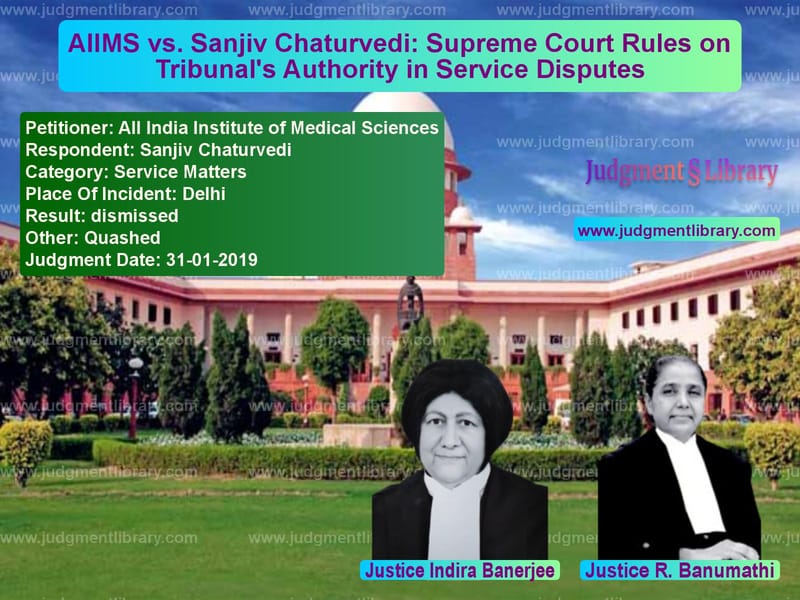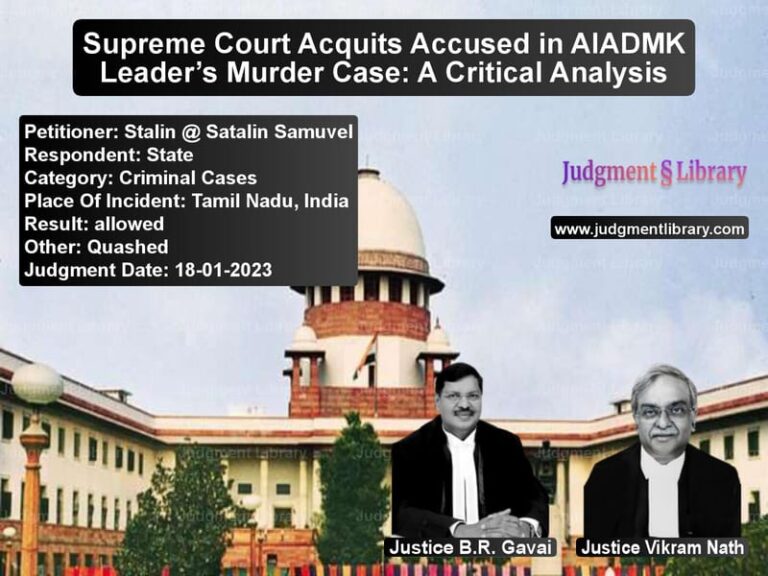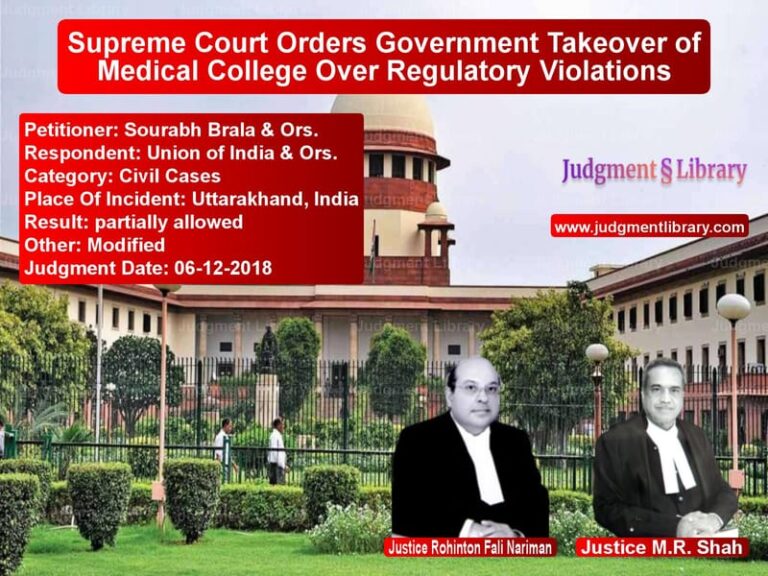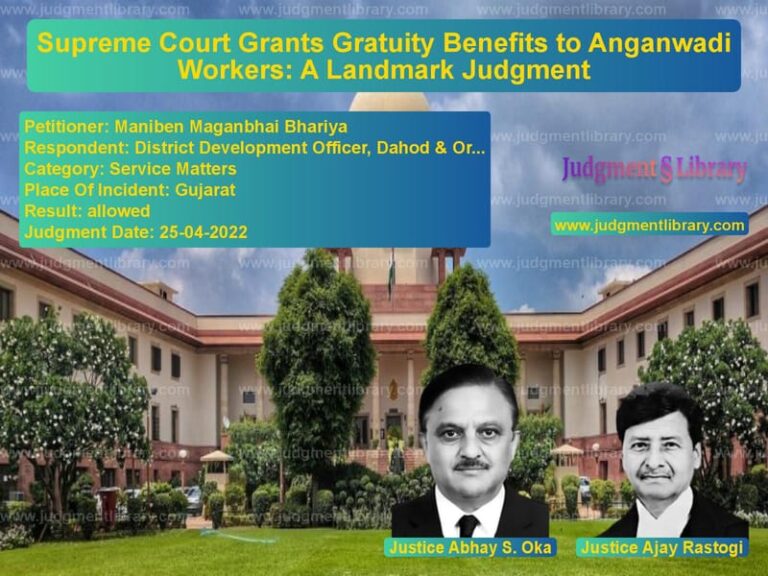AIIMS vs. Sanjiv Chaturvedi: Supreme Court Rules on Tribunal’s Authority in Service Disputes
The case of All India Institute of Medical Sciences (AIIMS) vs. Sanjiv Chaturvedi is a landmark ruling by the Supreme Court of India addressing the authority of the Chairman of the Central Administrative Tribunal (CAT) in staying proceedings before a Division Bench. The case involves a dispute over service matters related to Sanjiv Chaturvedi, an Indian Forest Service officer, regarding his performance appraisal and alleged administrative actions against him during his deputation at AIIMS.
Background of the Case
Sanjiv Chaturvedi, a 2002 batch Indian Forest Service officer of the Uttarakhand cadre, was appointed as Deputy Secretary at AIIMS, New Delhi, on deputation from June 29, 2012, to June 28, 2016. His role included overseeing infrastructure projects, coordinating administrative work, and acting as the Central Vigilance Officer (CVO). His tenure at AIIMS was marked by controversies over alleged corruption exposure, leading to his removal from key roles and eventual adverse service remarks.
Key Allegations and Administrative Decisions
- Initially praised for his integrity, Chaturvedi was later removed from the position of CVO in 2014.
- His work responsibilities were systematically withdrawn over time.
- He received an adverse Annual Confidential Report (ACR) for the year 2015-16, giving him a zero grading in all attributes.
- A memo issued on January 7, 2016, alleged indiscipline and insubordination.
- Chaturvedi challenged these actions before the Central Administrative Tribunal (CAT) and the Uttarakhand High Court.
Legal Issues and Chronology of Events
Challenges Against AIIMS’ Actions
- In 2016, Chaturvedi filed OA No.1342 before CAT, challenging the withdrawal of work responsibilities.
- In 2017, he filed OA No.331/00790 before the CAT’s Nainital Bench challenging the adverse ACR.
- The Nainital Bench granted an interim order restraining AIIMS from considering the adverse ACR in his career progression.
- AIIMS sought to transfer the case to the CAT Principal Bench in Delhi.
- The CAT Chairman, sitting singly, stayed the proceedings in the Nainital Bench.
- Chaturvedi challenged this stay order before the Uttarakhand High Court.
Arguments Before the Supreme Court
Appellant (AIIMS) Arguments
- The CAT Chairman had the authority to stay proceedings under Section 25 of the Administrative Tribunals Act.
- The cases before the Nainital and Delhi Benches involved similar matters, justifying the transfer.
- The High Court erred in ruling against the CAT Chairman’s order.
Respondent (Sanjiv Chaturvedi) Arguments
- The CAT Chairman had no power to interfere with a Division Bench’s proceedings.
- The cases in Delhi and Nainital had distinct causes of action.
- The stay order was an abuse of administrative authority and violated judicial discipline.
Supreme Court’s Observations and Judgment
The Supreme Court ruled in favor of Sanjiv Chaturvedi, holding that:
- The CAT Chairman, sitting singly, cannot stay proceedings before a Division Bench.
- Judicial decorum and discipline require that only a Bench of equal or higher strength can nullify an order of another Bench.
- The power under Section 25 of the Act does not include the authority to stay proceedings in another Bench.
- The Uttarakhand High Court was correct in setting aside the CAT Chairman’s order.
Final Judgment
The Supreme Court upheld the High Court’s decision, dismissing AIIMS’ appeal and imposing a cost of Rs. 25,000 on AIIMS to be deposited with the Supreme Court Legal Services Committee.
Legal Implications of the Judgment
This ruling has significant implications for service matters and administrative tribunals:
- Limits on Tribunal Chairman’s Authority: The decision establishes that a single-member Chairman cannot override a Division Bench’s judicial decision.
- Judicial Discipline: Ensures that administrative tribunals function with proper judicial hierarchy and discipline.
- Service Law Precedents: Strengthens protection for officers facing adverse service remarks due to whistleblowing or other administrative actions.
Conclusion
The Supreme Court’s ruling in AIIMS vs. Sanjiv Chaturvedi reinforces the principles of judicial discipline and procedural propriety in administrative tribunals. It prevents arbitrary interference in service disputes and ensures that administrative officers have a fair opportunity to contest adverse service actions. This case sets a precedent for handling service matters within the framework of judicial propriety and due process.
Petitioner Name: All India Institute of Medical Sciences.Respondent Name: Sanjiv Chaturvedi.Judgment By: Justice Indira Banerjee, Justice R. Banumathi.Place Of Incident: Delhi.Judgment Date: 31-01-2019.
Don’t miss out on the full details! Download the complete judgment in PDF format below and gain valuable insights instantly!
Download Judgment: All India Institute vs Sanjiv Chaturvedi Supreme Court of India Judgment Dated 31-01-2019.pdf
Direct Downlaod Judgment: Direct downlaod this Judgment
See all petitions in Employment Disputes
See all petitions in Disciplinary Proceedings
See all petitions in Judgment by Indira Banerjee
See all petitions in Judgment by R. Banumathi
See all petitions in dismissed
See all petitions in Quashed
See all petitions in supreme court of India judgments January 2019
See all petitions in 2019 judgments
See all posts in Service Matters Category
See all allowed petitions in Service Matters Category
See all Dismissed petitions in Service Matters Category
See all partially allowed petitions in Service Matters Category







